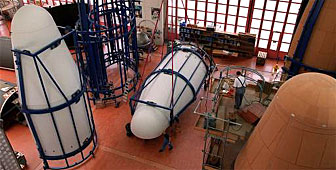Switzerland marks 40 years of European space research

In 1960, Switzerland took a crucial first step in the creation of the European Space Agency (ESA). Leading lights in the Swiss space community have been celebrating the achievements of the past 40 years, and looking ahead to the future.
The celebrations in Lausanne coincided with the launch of a book: “Switzerland, Europe and Space: an Adventure and a Necessity”.
The launch marked the 40th anniversary of the Meyrin Accord, signed at CERN, the European nuclear research centre just outside Geneva, following a space conference organised by the then Swiss Foreign Minister, Max Petitpierre.
“The Meyrin Accord was the birth certificate of what Europe has become today in space,” said Peter Creola, head of the Swiss Space Office (SSO).
“Things like Ariane and the big satellite projects could not possibly have been done without European states cooperating. Switzerland is proud to have contributed to that effort,” Creola told swissinfo.
The SSO is the body that coordinates the space policies of all government departments. Unlike most other members of the ESA, Switzerland does not have a central space programme, and so all of its projects are carried out through the ESA.
It is for this reason that Switzerland proposed the Prodex scheme, in which around half of ESA’s members now participate. The scheme helps to fund experiments on board ESA satellites.
Scientific research is one of the key elements underpinning Switzerland’s commitment to space exploration and exploitation.
“If you want to learn about the environment in its widest sense, you have to go beyond the Earth’s atmosphere,” said Thierry Courvoisier, head of space research at the Swiss academy of natural sciences.
“There are certain things about our planet that you can only learn in space,” he added.
Courvoisier, an astrophysicist at Geneva University, heads the Integral Science Data Centre at Versoix, in canton Geneva. It is a joint ESA-Russian project that aims to launch a satellite in 2002 to study gamma rays.
“Even without a national space facility, we are able to take advantage of the collaboration we have with other states in Europe,” Courvoisier told swissinfo.
That collaboration allows a small country like Switzerland to provide input into big projects such as Ariane and the International Space Station.
It is also a measure of Switzerland’s wider aspirations. As the Swiss President, Adolf Ogi, said in his message on the occasion of the 40th anniversary: “The European Space Agency shows that a united Europe, with Switzerland as a full member, can succeed.”
There is little doubt that Ogi and his cabinet would love to see that replicated in other areas of human endeavour.
“Space cooperation was one of the areas where Switzerland dared to take the initiative,” Creola said. “The first ever inter-governmental conference on space on this planet was held 40 years ago at the invitation of the Swiss government.”
And that has continued. “There may be obstacles to our joining Europe politically,” Creola went on, “But we have demonstrated though our participation in the ESA, that we are an active member of Europe.”
Creola believes that should European political integration proceed, the ESA will inevitably become a kind of European Union space agency: “ESA will become the NASA of the modern Europe. Europe cannot do without its own space capability.”
Moves in this direction have already begun. The EU and the ESA recently agreed a common space strategy, but Creola, who until recently chaired the ESA committee on long-term space policy, believes a more expansive view is required.
“What is lacking in Europe is an awareness of the long-term potential of space,” he told swissinfo.
“You really need a paradigm change. The Earth is a tiny island in an immense ocean. The survival of our civilisation on this island is not guaranteed. By using extraterrestrial resources, such as energy and materials, we can help ensure that survival,” was Creola’s conclusion.
by Roy Probert

In compliance with the JTI standards
More: SWI swissinfo.ch certified by the Journalism Trust Initiative








You can find an overview of ongoing debates with our journalists here . Please join us!
If you want to start a conversation about a topic raised in this article or want to report factual errors, email us at english@swissinfo.ch.